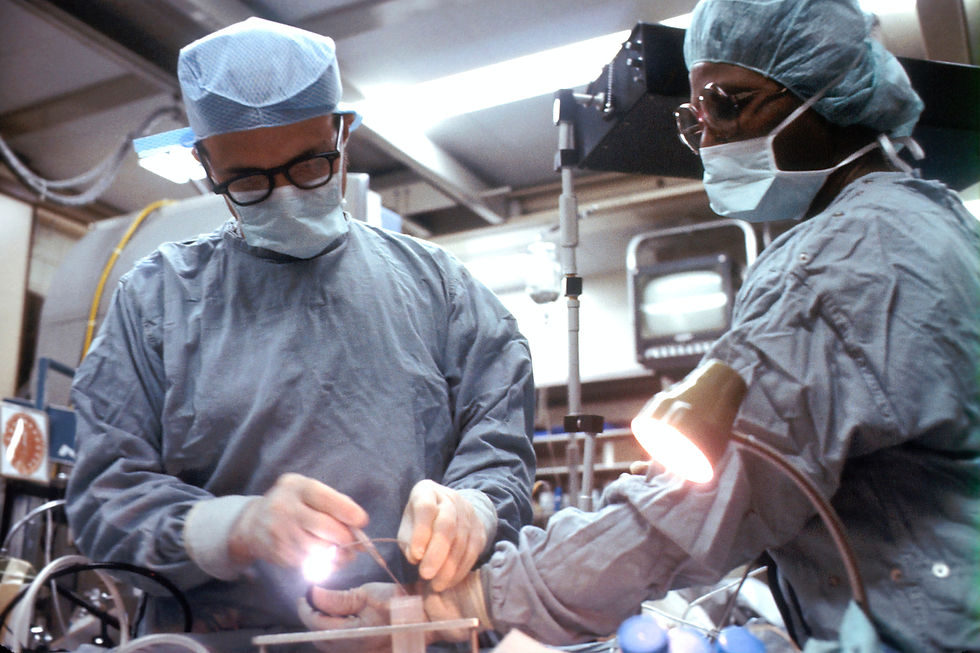How to Successfully Become a Surgeon
- Destined Doctors
- Jun 21, 2020
- 4 min read
By: Jacqueline Wu
The decision to become a surgeon is an alluring one to aspiring doctors interested in entering an advanced and well-paid profession. Surgeons specialize in treating patients' injuries, diseases, and other conditions through operations. They examine patients, interpret diagnostic testing, and use instruments to perform surgery on the patients. When the surgeon determines surgery is needed, they must also decide if a patient is a good candidate for surgery. This means determining if the patient is healthy enough for surgery. Pre-operative tests, including blood work and an EKG, are often ordered to rule out health problems that could make surgery too risky to perform. Most surgeons will also provide post-operative care and medications for patients to recover from the procedure. Due to the significant responsibility placed in a surgeon's hands, it's no surprise that the training process is lengthy.
Is a surgical career right for you? You will need a mix of the following skills and qualities:
Specialist knowledge for accurate diagnosis of a patient’s condition.
Good communication skills – speaking to your medical team, your patients and their families; listening to and understanding the concerns of a wide range of people and earning their trust.
A bright and eager mind as well as manual dexterity and physical skills for performing an operation.
Extensive experience of preoperative and postoperative care.
Ability to adapt to a changing environment – as healthcare evolves and there are medical developments, you will need to have commitment and enthusiasm for learning new skills and techniques.
Leadership skills to manage your team and to help train the surgeons of the future.
The ability to inspire confidence in others.
Emotional resilience and the ability to support your team in difficult circumstances.

After graduating from high school, the first step towards becoming a surgeon is to achieve a four-year bachelor's degree from an accredited post-secondary institution. Choosing an undergraduate school is the first major step any student will make on the path to becoming a physician. If you're an aspiring pre-med student, you'll want to give yourself the best opportunities and most extensive networks in college and beyond. While there isn't a required undergraduate major for future surgeons, most choose to study science. You may wish to declare a major in biology, health science, chemistry, physics, kinesiology, or any other field. Regardless, a future surgeon must make certain that they’re fulfilling the pre-med course requirements and obtaining real-world healthcare experience to boost your medical school application(s). Applying to (and succeeding in) medical school is a grueling process, so it is important to be mentally prepared. You'll also need to take and pass the Medical College Admission Test (MCAT) in your senior year of college. Admissions councils review the test scores and student records to decide if applicants have the merit and the knowledge to succeed in medical school. Medical school experience is accumulated through four years of hard work which is useful in preparing for residency. Along the way, you might take courses that include, but are not limited to:
Homeostasis, I & II
Mind, Brain, and Behavior
Development
Practice of Medicine
Immunity and Disease
Aspiring surgeons must attend medical school to complete a Medical Doctor (M.D.) or Doctor of Osteopathic Medicine (D.O.) degree. Remember that an M.D. prepares you for practicing allopathic medicine, whereas the D.O. will focus on osteopathic medicine from a more holistic viewpoint. In the first two years, you'll spend time taking advanced courses related to biochemistry, physiology, human anatomy, pharmacology, pathophysiology, microbiology, and preventative medicine. The last two years are then dedicated to obtaining patient care practice by completing clinical rotations under the supervision of doctors. Surgical experience must be gained in areas including the abdomen, endocrine system, vascular surgery and solid organ transplant.
Once you've completed medical school, you'll then need to participate in a surgical residency program. A surgical residency program can last anywhere from three to eight years, depending on what you want to specialize in. It is important to choose a specialty and then review residency requirements before you can earn your license. During your residency, you'll have the freedom to specialize in a certain type of surgery. These include specialties such as orthopedic, neurological, cardiovascular, thoracic, obstetrical, and pediatric surgery.

Residents work within their hospital or surgical center to treat patients with guidance from experienced surgeons. According to the American Medical Association (AMA), general surgery residencies tend to last around five years; however, sub-specialties in surgery will tack on an additional one to three years full-time.
Overall, Surgeons play an important role in our healthcare system to repair, replace, or remove portions of the internal body. Since human life is at risk on the operating table, surgeons are highly trained to carry out emergency tactics that save the lives of patients. Although the road to become a surgeon is long, there's a strong demand for qualified surgeons. In fact, employment growth is expected to soar, increasing by 18 percent over the next decade. If the path is right for you, your road to becoming a surgeon starts now!
References:



Comments